Day的介词修饰用法
介词用法大全
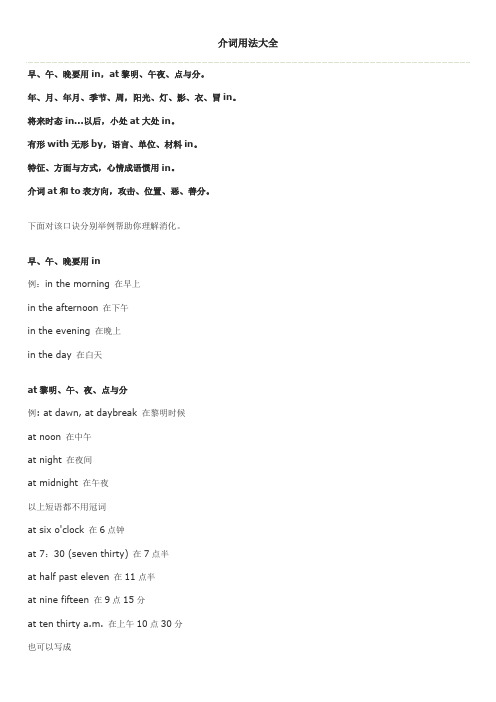
介词用法大全早、午、晚要用in,at黎明、午夜、点与分。
年、月、年月、季节、周,阳光、灯、影、衣、冒in。
将来时态in...以后,小处at大处in。
有形with无形by,语言、单位、材料in。
特征、方面与方式,心情成语惯用in。
介词at和to表方向,攻击、位置、恶、善分。
下面对该口诀分别举例帮助你理解消化。
早、午、晚要用in例:in the morning 在早上in the afternoon 在下午in the evening 在晚上in the day 在白天at黎明、午、夜、点与分例: at dawn, at daybreak 在黎明时候at noon 在中午at night 在夜间at midnight 在午夜以上短语都不用冠词at six o'clock 在6点钟at 7:30 (seven thirty) 在7点半at half past eleven 在11点半at nine fifteen 在9点15分at ten thirty a.m. 在上午10点30分也可以写成seven to five 5点差7分(半小时以上)five minutes after two 2点过5分at a quarter to two 1点45分at the weekend 在周末年、月、年月、季节、周即在“来年”,在“某月”,在“某年某月” (但在某年某月某日则用on),在四季,在第几周等都要用in。
例;in 1986 在1986年in 1927 在1927年in April 在四月in March 在三月in December 1986 1986年12月in July l983 1983年7月in spring 在春季in summer 在夏季in autumn 在秋季in winter 在冬季in the fist week of this semester 这学期的第一周in the third week 在第三周阳光、灯、影、衣、冒in,即在阳光下,在灯下,在树阴下,穿衣、着装、冒雨等都要用in。
介词的用法

介词的用法
1)具体时间前介词用at。
.He gets up at half past seven every day.他每天七点半起床。
She goes to bed at eleveno’clock.她十一点睡觉。
2)表示“在早上,在下午,在晚上”的短语中用介词in,且定冠词the不能省略;表示“在中午,在夜里”的短语中介词用at,不加冠词。
in the morning在早上,in the afternoon在下午,in the evening在晚上
at noon在中午,atnight在夜里
3)表示“在某天”、“在某天的上午、下午等”的短语用介词on。
What do you usually do on Monday morning?星期一上午你通常做什么?
Do you sometimes go out to ea ton Friday evening?有时你星期五晚上出去吃饭吗?
He watches DVDs on Saturday night.星期六晚上他看DVD。
Parents take children to parks on June 1.六月一日,家长们带着孩子去公园。
4)在this,last,next,every等词前面既不加介词,也不用冠词。
What are you doing this afternoon?今天下午你做什么?
He visits his grandma every Friday.他每个星期五都去看望祖母。
She is going to Shanghai next Monday.她下个星期一去上海。
介词的用法

介词的用法节日若是Day,表示具体某天,一般用on,如on Christmas Day,(但要注意是at Christmas),on Children's Day,on Dragon Boat Day,on Christmas Eve另外,表示具体到某天的某段时间也是用on,如on the morning of New Year's Day而festival一般是at,如at Spring Festival一、节日前面用什么介词?节日前面用什么介词,按英语语法,节日之前的介词用法有四种:1)谈到圣诞节、新年、复活节和感恩节,如指整个节日,就用at。
如:We often go carolling at Christmas. 我们在圣诞节常去唱颂歌。
We’re having the roof repaired at Easter. 我们要在复活节期间找人把房顶修一修。
Some children make lanterns out of pumpkins at Hallowe’en. 有些儿童在万圣节前夕用南瓜做灯笼。
2)但如果指节日中的某一天,就用on。
如:Come and see us on Christmas Day. 圣诞节那一天来玩儿吧。
What are you doing on Easter Monday? 复活节第二天你干什么?3)表示周末时,英国人说at the weekend,而美国人则说on the weekend。
如:What did you do at the weekend? 你周末干什么了?He likes to go climbing at weekends. 他喜欢在周末做登山运动。
They like to go ballooning at weekends. 他们周末喜欢乘气球玩。
4)当然,若强调是在整个期间,也可用during等。
如:Five thousand people were flown to Paris during the Easter weekend. 在复活节的周末有五千人乘飞机去巴黎。
someday和one day的用法

someday和one day的用法someday和one day的用法•定义•用作副词•用作名词•用作介词•注意事项定义someday和one day都是用于表达“某一天”、“将来某个时候”的短语,可以用于表示未来的计划、梦想或期望。
两者在意义上相似,但在用法和语气上稍有区别。
用作副词1.Someday,有时也写作some day,是指一个未来的时间,但不确定具体的日期或时间。
–I’ll visit Tokyo someday.–She hopes to become a doctor someday.–Someday, I’ll have my own business.–在这些例句中,someday表示的是一个模糊的将来时刻。
2.One day,意为“某一天”,通常用于描述一个具体或预期的时间。
–One day, I will travel the world.–He hopes to marry his girlfriend one day.–One day, I’ll write a novel.–one day可以表示在将来某个确定的日子。
用作名词1.Someday作为名词时,表示“未来的某一天”或“将来的某个时间点”。
–She dreams of a better someday.–Don’t wait for someday, make it happen now.–I believe a brighter someday is waiting for us.–意思是相信未来会更好。
2.One day作为名词时,也表示未来的某个时间。
与someday相比,它更侧重于强调一个具体或追求的目标。
–She is determined to achieve her goals, come what may, one day.–One day, I’ll make my dreams come true.–They saved up for years in order to buy their dream house one day.–这里的one day表达了希望和努力实现某个目标的意愿。
英语介词用法大全

英语介词用法大全★早、午、晚要用in,at黎明、午夜、点与分。
年、月、年月、季节、周,阳光、灯、影、衣、冒in。
将来时态in...以后,小处at大处in。
有形with无形by,语言、单位、材料in。
特征、方面与方式,心情成语惯用in。
介词at和to表方向,攻击、位置、恶、善分。
★日子、日期、年月日,星期加上早、午、晚,收音、农场、值日on,关于、基础、靠、著论。
着、罢、出售、偷、公、假,故意、支付、相反,准。
特定时日和“一……就”,on后常接动名词。
年、月、日加早、午、晚,of之前on代in。
步行、驴、马、玩笑on,cab,carriage则用in。
★at山脚、门口、在当前,速、温、日落、价、核心。
工具、和、同随with,具有、独立、就、原因。
就……来说宾译主,对、有、方状、表细分。
海、陆、空、车、偶、被by,单数、人类know to man。
★this、that、tomorrow,yesterday,next、last、one。
接年、月、季、星期、周,介词省略已习惯。
over、under正上下,above、below则不然,若与数量词连用,混合使用亦无关。
…beyond超出、无、不能,against靠着,对与反。
besides,except分内外,among之内along沿。
同类比较except,加for异类记心间。
★原状because of,、owing to、due to表语形容词under后接修、建中,of、from物、化分。
★before、after表一点, ago、later表一段。
before能接完成时,ago过去极有限。
since以来during间,since时态多变换。
与之相比beside,除了last but one。
复不定for、找、价、原,对、给、段、去、为、作、赞。
快到、对、向towards,工、学、军、城、北、上、南。
but for否定用虚拟,复合介词待后言。
ing型由于鉴,除了除外与包合。
冠词与介词的用法讲解及练习

冠词与介词的用法讲解一、冠词分类及其用法1.冠词的分类不定冠词:a 和an冠词定冠词: the零冠词: 不使用冠词2.不定冠词的用法(1)a用在以辅音音素开头的单词前. A useful bookan用在以元音音素开头的单词前.An egg(2)基本用法:指人或事物的某一种类e.g. She is a girl. 她是女孩.This is a desk. 这是一张书桌.(3)泛指某人或者某物,但又不具体说明何人何物.e.g. I can see a kite. 我能看见一只风筝 A boy is in Grade 1.(4)表示“数量”,“有一”“每一”的意思.e.g. We have six classes a day. 我们一天上六节课.(5)表示“同一”,相当于the samee.g The two boys are of ___an___ age.Cotton of ___a___ kind was stored together.(6)用于某些物质名词或抽象名词前,表示“一种、一类、一份、一场、一阵”.e.g That is __a__ green tea.They were caught in __a___ heavy rain.a pleasure / a success/ a failure(7)用于专有名词前表示类似的一个或某一个.e.g ______A__ Mr. Li is asking to see you at the school gate.(8)否定比较级表达最高级意义时,常用借助于不定冠词a/ an. a/ an+比较级e.g. --- What do you think of the film?--- Oh, I’ve never seen a worse one.3.定冠词的用法(1)基本用法:“特指”.特指某(些)人或者某(些)事物,以便与其他的人或物有所区别.e.g.The book on the desk is Jim’s. 书桌上的那本书是吉姆的.The chairs are there. 椅子在那里.(2)指谈话双方都知道的人或事物.e.g. Where is the kite? 风筝在哪儿?(双方都知道指的是哪只风筝.)Open the door, please.请把门打开.(双方都知道要打开哪扇门.)(3)在叙述中,上文提到过的人或者事物,再次出现时.e.g. A:I can see a kite. 我看见一只风筝B:Where is the kite?这个风筝在里?(4)用在姓氏的复数名词前,表示“一家人”e.g. the Blacks 布来克一家(5)用在宇宙间独一无二的天体名词之前.e.g.the sun the sky the moon the earth(6)用在序数词和形容词最高级,及形容词only, very, same 前.e.g. I live on the second floor.我住在二楼Skating is the best sport in winter. 滑冰是冬天最好的运动(7)用在某些建筑物和旅馆的名称之前.The Palace Museum (故宫) The Summer Palace (颐和园)(8)在江河、山脉、湖泊、海洋、群岛、海峡、海湾运河前用the。
day 前何时用on何时用in
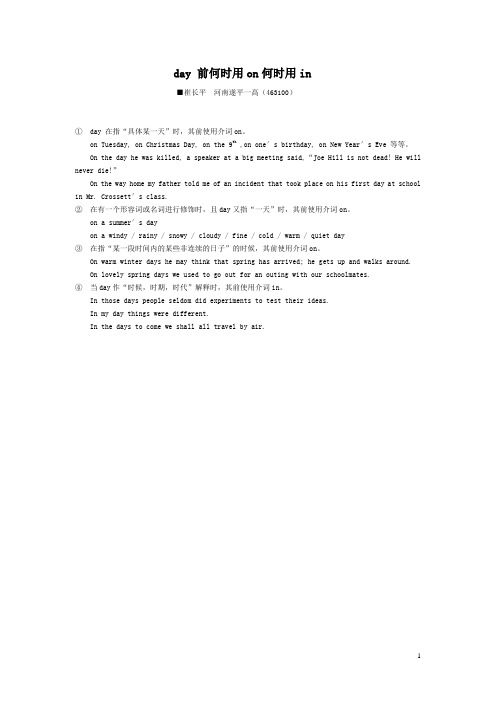
day 前何时用on何时用in■崔长平河南遂平一高(463100)①day 在指“具体某一天”时,其前使用介词on。
on Tuesday, on Christmas Day, on the 9th ,on one′s birthday, on New Year′s Eve 等等。
On the day he was killed, a speaker at a big meeting said,“Joe Hill is not dead! He will never die!”On the way home my father told me of an incident that took place on his first day at school in Mr. Crossett′s class.②在有一个形容词或名词进行修饰时,且day又指“一天”时,其前使用介词on。
on a summer′s dayon a windy / rainy / snowy / cloudy / fine / cold / warm / quiet day③在指“某一段时间内的某些非连续的日子”的时候,其前使用介词on。
On warm winter days he may think that spring has arrived; he gets up and walks around.On lovely spring days we used to go out for an outing with our schoolmates.④当day作“时候,时期,时代”解释时,其前使用介词in。
In those days people seldom did experiments to test their ideas.In my day things were different.In the days to come we shall all travel by air.1。
that day, this day, these days, those days前用介词吗
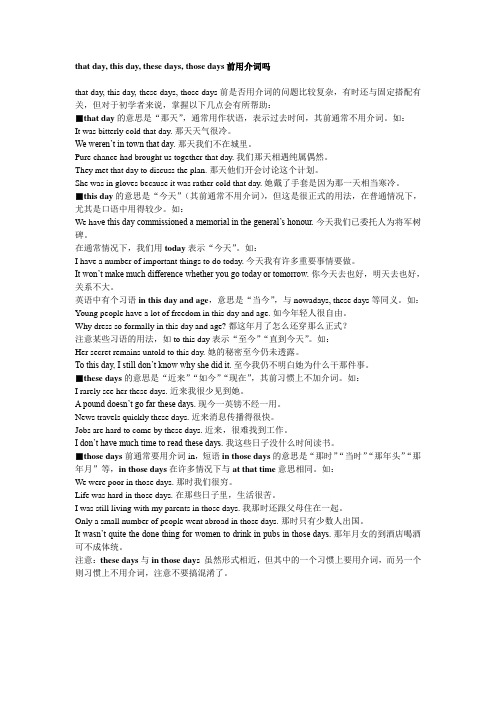
that day, this day, these days, those days前用介词吗that day, this day, these days, those days 前是否用介词的问题比较复杂,有时还与固定搭配有关,但对于初学者来说,掌握以下几点会有所帮助:■that day 的意思是“那天”,通常用作状语,表示过去时间,其前通常不用介词。
如:It was bitterly cold that day. 那天天气很冷。
We weren’t in town that day.那天我们不在城里。
Pure chance had brought us together that day. 我们那天相遇纯属偶然。
They met that day to discuss the plan. 那天他们开会讨论这个计划。
She was in gloves because it was rather cold that day. 她戴了手套是因为那一天相当寒冷。
■this day 的意思是“今天”(其前通常不用介词),但这是很正式的用法,在普通情况下,尤其是口语中用得较少。
如:We hav e this day commissioned a memorial in the general’s honour.今天我们已委托人为将军树碑。
在通常情况下,我们用today 表示“今天”。
如:I have a number of important things to do today. 今天我有许多重要事情要做。
It won’t make much difference whether you go today or tomorrow.你今天去也好,明天去也好,关系不大。
英语中有个习语 in this day and age,意思是“当今”,与 nowadays, these days 等同义。
如:Young people have a lot of freedom in this day and age. 如今年轻人很自由。
中国节日及介词用法
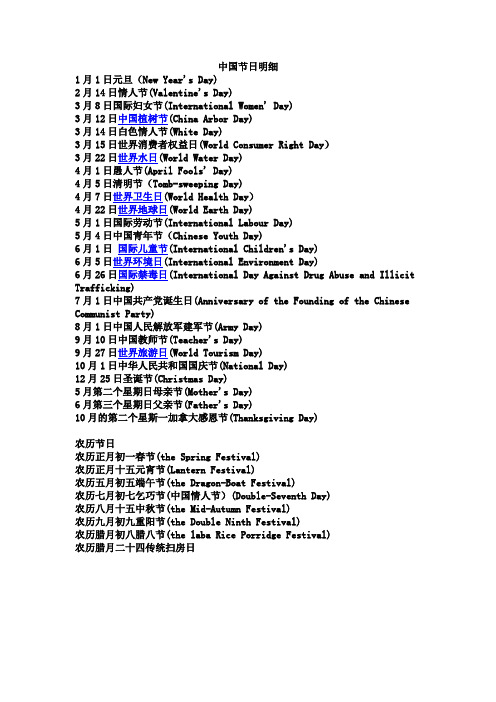
中国节日明细1月1日元旦(New Year's Day)2月14日情人节(Valentine's Day)3月8日国际妇女节(International Women' Day)3月12日中国植树节(China Arbor Day)3月14日白色情人节(White Day)3月15日世界消费者权益日(World Consumer Right Day)3月22日世界水日(World Water Day)4月1日愚人节(April Fools' Day)4月5日清明节(Tomb-sweeping Day)4月7日世界卫生日(World Health Day)4月22日世界地球日(World Earth Day)5月1日国际劳动节(International Labour Day)5月4日中国青年节(Chinese Youth Day)6月1日国际儿童节(International Children's Day)6月5日世界环境日(International Environment Day)6月26日国际禁毒日(International Day Against Drug Abuse and Illicit Trafficking)7月1日中国共产党诞生日(Anniversary of the Founding of the Chinese Communist Party)8月1日中国人民解放军建军节(Army Day)9月10日中国教师节(Teacher's Day)9月27日世界旅游日(World Tourism Day)10月1日中华人民共和国国庆节(National Day)12月25日圣诞节(Christmas Day)5月第二个星期日母亲节(Mother's Day)6月第三个星期日父亲节(Father's Day)10月的第二个星斯一加拿大感恩节(Thanksgiving Day)农历节日农历正月初一春节(the Spring Festival)农历正月十五元宵节(Lantern Festival)农历五月初五端午节(the Dragon-Boat Festival)农历七月初七乞巧节(中国情人节)(Double-Seventh Day)农历八月十五中秋节(the Mid-Autumn Festival)农历九月初九重阳节(the Double Ninth Festival)农历腊月初八腊八节(the laba Rice Porridge Festival)农历腊月二十四传统扫房日1. at指时间表示:(1)时间的一点、时刻等。
英语中常用介词in、on、at、to的用法区别

英语中常用介词in、at的用法区别1.早、午、晚要用inin the evening 在晚上in the day 在白天2.at黎明、午、夜、点与分例at dawn at daybreak 在黎明时候;at night 在夜间;at noon 在中午;at midnight 在午夜以上短语都不用冠词at nine o'clock 在9点钟;at half past ten 在10点半;at ten thirty a.m. 在上午10点30分;at the weekend 在周末;at a quarter to two 1点45分3.年、月、年月、季节、周即在“来年”,在“某月”,在“某年某月” 但在某年某月某日则用on ,在四季,在第几周等都要用in。
例:in 1989 在1989年;in 1927 在1927年;in March 在三月;in December 1986 在1986年12月第一周;in the third week 在第三周;in spring 在春季in summer 在夏季;in autumn 在秋季in winter 在冬季4.在阳光下,在灯下,在树阴下,穿衣、着装、冒雨等都要用in。
例They are reviewing their lessons in the bright light.他们在明亮的灯光下复习功课。
They are playing in the shade of a tree. 他们坐在树阴下玩耍。
He went in the rain to meet me at the station. 他冒雨到车站去接我。
The poor in rags in old society. 旧社会穷人们衣衫褴褛.以及:in the bright sunlight 在明亮的阳光下;the woman in white black red yellow穿着白黑、红、黄色衣服的妇女;in uniform 穿着制服;in red shoes 穿着红色鞋in his shirt sleeves 穿着衬衫5.将来时态in...以后例They will come back in 10 days.他们将10天以后回来。
介词和介词短语
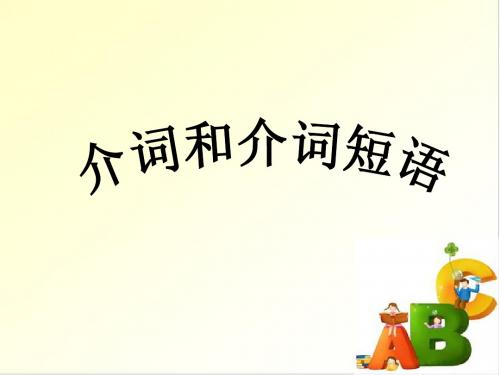
4) 表示“支持,反对”的介词 against:意为“反对”,指在观点或主张方 面与某人采取对立的态度。 for: 指在观点或主张等方面与某人采 取一致的态度,意思是“支持, 赞成”,与in favor of 同义。 注意: against还有“倚着,靠着”的意思。 e.g. His bed is against the wall. 他的床靠墙放着。
(3) near,beside,by beside和near都有“靠近”的意思, beside强调“在……旁边(=at the side of)”, 指两者的位置关系,多用于人; near意为“在……附近(=at a short distance from)”,表示两者之间的距离, 多用于场所,另外near还可表示时间或程 度等。 by表示“在……旁边”时含有“倚,凭, 靠,沿着”等意。
except for:意为“除……之外”,它的含义 是 肯定句子主体,排除局部。 besides:意为“除……之外(还有……)”。 注意: besides还可用作副词,意为“而且;还有”。 e.g. I don't want to go; besides, I am too tired. 我不想去了,再说我也太累了。
② below,under,beneath皆可表示 “在……之下”。 below表示不垂直并与表面不接触的下方; under表示垂直并与表面不接触的下方; beneath表示在某物之下,可以表示垂直 或不垂直,也可以表示上下接触的意思。
(2) in front of,in the front of 两个介词短语皆有“在前面”的意思, 区别是: in front of通常相对于某物体的外部来 说,指某人或某物位于该物前面,意为 “在……前面”; in the front of通常相对于空间而言,指 某人或某物位于某个空间的内部,意为 “在……的前部”。
介词常见11个用法归纳

介词1.介词的含义,介词(虚词),不能在句子中独立充当成分。
它总是用于名词、代词、或相当于名词的其它词类或短语活从句前。
中考需要掌握的11个介词:in、on、at、to、from、by、with、for、about、after、before表示时间的介词A.典型例题:1.in 1996 / in 2002 / in 1847(年份)2.in October / in February / in March (月份)3.in spring / in summer / in autumn / in winter (季节)4.in a week / in a year 在1周/ 年中5.in the morning / in the afternoon / in the evening 在上午/ 下午/ 晚上in those days 在当时/ in no time 立刻/ in the daytime 在白天/ in the future 在将来/ in one minute 在1分钟内/ 最后in the end表示较长时间(长于一天或短于一天)如:年、年份、月份、季节、周、上午、下午、晚上以及一些习惯用法中要用介词“in”。
-------------------------------------------------------------------------------------------------------------------------------- B.典型例题:1.at ten o’clock / at seven thirty. (表示某一钟点)2.at noon / at night / at midnight (在中午、晚上、半夜――一天中相对短暂的时间)3.at the age of twenty / at the age of thirty-five (表示某一年龄)4.at that time 在那时/ at the moment 这时、那时、此刻/ at first 首先/ at last 最后=in the end/ at once 立刻、马上/ at / on (the) weekends 在周末/ 在一年中的这个时候at this time of year / 在……开始/结束时at the beginning /end of表示时间的某一点(或表示某时刻)如:钟点、年龄或其它的习惯用法中要用“at”。
英语什么是介词分类及用法

英语什么是介词分类及用法英语介词数量虽然相对较少但意义丰富,它是各种语言中意义最丰富的词汇,英语里什么是介词呢?下面是店铺整理的英语什么是介词,欢迎阅读。
英语什么是介词介词(preposition 简写prep.)又称作前置词,表示名词、代词等与句中其他词的关系,在句中不能单独作句子成分。
介词后面一般有名词、代词或相当于名词的其他词类、短语或从句作它的宾语,表示与其他成分的关系。
介词和它的宾语构成介词词组,在句中作状语,表语,补语,定语或介词宾语。
介词可以分为时间介词、地点介词、方式介词、原因介词、数量介词和其他介词。
介词一般用于名词或者代词前面,表示该词与句中其他成分的关系。
介词后面的名词或代词称为介词宾语(如果是人称代词,则要用宾格)。
介词和介词宾语合在一起构成介词短语。
英语介词的分类及用法介词的分类和应用英语介词虽是小词,数量也不多,但它灵活多变,随处可见,功能强大而且难于掌握。
在现代英语中,介词的地位非常重要。
我们切不可小看这个小角色,不可忽视它的作用。
如果你能在英语介词上下一番功夫,那么你的英语水平会有一个飞跃提高。
英语介词分类:按结构英语介词可分为3类:1.简单介词(约有70个),如:in,at,on,by,with,down,for,beside,along,across等。
2.分词介词(约15个)如:during,following,considering,regarding,speaking,judging,talking等。
3.成语介词(约有500个)如:out of,apart from(除之外:别无、尚有),because of,by means of用、依靠等。
按意义英语介词可分为3类:1. 时间介词,如:at, on, in, during, over, from, for, until等。
2. 地点介词,如:at, on, in, across, to, over, between, inside,outside等。
day 英文三单
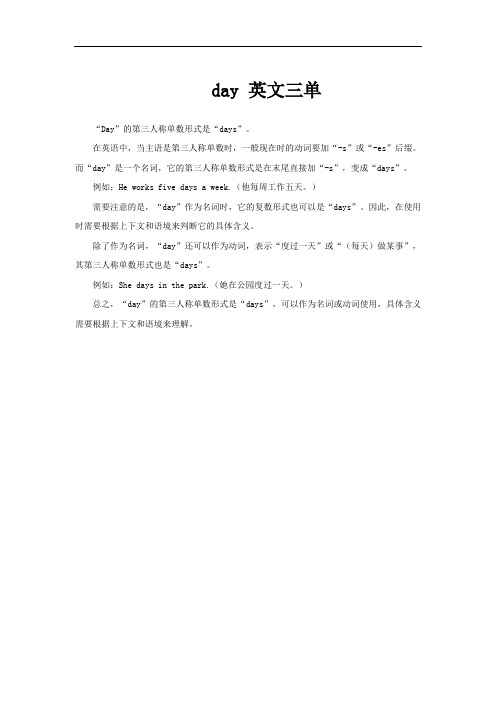
day 英文三单
“Day”的第三人称单数形式是“days”。
在英语中,当主语是第三人称单数时,一般现在时的动词要加“-s”或“-es”后缀。
而“day”是一个名词,它的第三人称单数形式是在末尾直接加“-s”,变成“days”。
例如:He works five days a week.(他每周工作五天。
)
需要注意的是,“day”作为名词时,它的复数形式也可以是“days”。
因此,在使用时需要根据上下文和语境来判断它的具体含义。
除了作为名词,“day”还可以作为动词,表示“度过一天”或“(每天)做某事”,其第三人称单数形式也是“days”。
例如:She days in the park.(她在公园度过一天。
)
总之,“day”的第三人称单数形式是“days”,可以作为名词或动词使用,具体含义需要根据上下文和语境来理解。
on the day of……句子解析

on the day of……句子解析
"on the day of" 是一个介词短语,用来指明某个特定的日期或事件发生的那一天。
它通常用于句子中来描述某个具体的时间点或事件。
下面是几个示例句子来解析"on the day of" 的用法:
On the day of my graduation, my whole family came to celebrate with me.
(在我毕业的那一天,我的整个家庭都来和我一起庆祝。
)
She received a promotion on the day of her work anniversary.
(她在工作纪念日那天得到了晋升。
)
We had a big party on the day of our wedding.
(在我们结婚的那一天,我们举办了一场盛大的派对。
)
On the day of the exam, I woke up early to review my notes.
(考试那天,我早早起床复习笔记。
)
He proposed to his girlfriend on the day of their anniversary.
(在他们纪念日那天,他向女友求婚。
)
这些句子中"on the day of" 表达了特定日期或事件发生的那一天。
它帮助准确地指明了时间,并使句子更具描述性和具体性。
英语语法-介词用法及固定搭配

英语常用介词介词的分类和应用英语介词虽是小词,数量也不多,但它灵活多变,随处可见,功能强大而且难于掌握。
在现代英语中,介词的地位非常重要。
我们切不可小看这个小角色,不可忽视它的作用。
如果你能在英语介词上下一番功夫,那么你的英语水平会有一个飞跃提高。
英语介词分类:按构成形式分(5类):1.简单介词如:in,at,on,by,with,down,for,beside,along,across等。
2.分词介词(在英语中有一部分动词的ing形式具备介词的性质,在很多情况下将他们视为介词)如:including,during,following,considering,regarding关于,speaking,judging,talking等。
3.双重介词如:from behind从后面 until after直到…之后from among从…中间4.合成介词如:inside,outside,onto,into,within5.短语介词如:out of,apart from(除之外:别无、尚有),because of,by means of用、依靠等A. 介词短语的词性--形容词1) 常用于做定语的介词短语的介词of: a child of sixwith: a man with a suitcasein: a girl in redto: the key to the doorfor: a war for moneyabout: an agreement about trade2)常用于做表语的介词短语的介词at: She was at a loss.beyond;The road is beyond the hill.in: He’s still in danger.of: It’s of no value.on: He is on guard.值班out of: I’m out of job.under: He’s under forty.3) 用于做宾语补足语:I saw George at work.A cold kept him in bed for 7 days.B. 介词短语的词性—副词1)做状语,主要用于修饰谓语:He has been here since Monday.Bake it is for two hours.2) 用于be+adj.结构:She is afraid of snakes.I’m sorry about that.3) 修饰非谓语动词:I asked to speak to the headmaster.介词--短语动词中的关键角色含有介词的短语动词1. v.+ prep :agree with/to/on/in, answer for, ask for, come across, go after, live on, run into, head for, look for/after/at 等。
介词用法大全
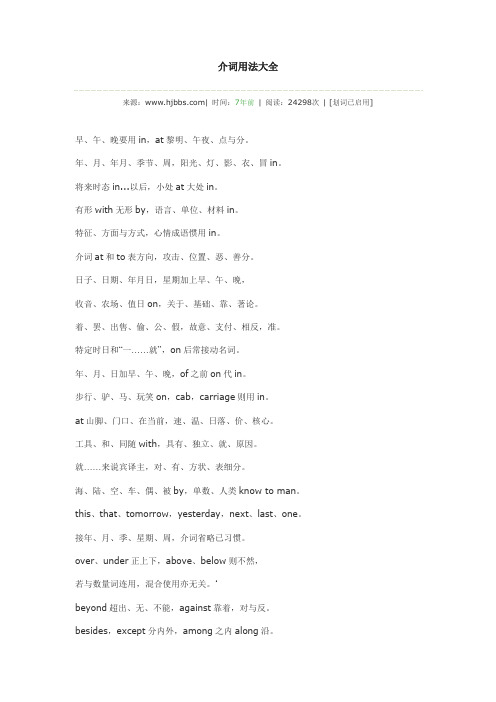
介词用法大全来源:| 时间:7年前| 阅读:24298次| [划词已启用] 早、午、晚要用in,at黎明、午夜、点与分。
年、月、年月、季节、周,阳光、灯、影、衣、冒in。
将来时态in...以后,小处at大处in。
有形with无形by,语言、单位、材料in。
特征、方面与方式,心情成语惯用in。
介词at和to表方向,攻击、位置、恶、善分。
日子、日期、年月日,星期加上早、午、晚,收音、农场、值日on,关于、基础、靠、著论。
着、罢、出售、偷、公、假,故意、支付、相反,准。
特定时日和“一……就”,on后常接动名词。
年、月、日加早、午、晚,of之前on代in。
步行、驴、马、玩笑on,cab,carriage则用in。
at山脚、门口、在当前,速、温、日落、价、核心。
工具、和、同随with,具有、独立、就、原因。
就……来说宾译主,对、有、方状、表细分。
海、陆、空、车、偶、被by,单数、人类know to man。
this、that、tomorrow,yesterday,next、last、one。
接年、月、季、星期、周,介词省略已习惯。
over、under正上下,above、below则不然,若与数量词连用,混合使用亦无关。
…beyond超出、无、不能,against靠着,对与反。
besides,except分内外,among之内along沿。
同类比较except,加for异类记心间。
原状because of,、owing to、due to表语形容词under后接修、建中,of、from物、化分。
before、after表一点, ago、later表一段。
before能接完成时,ago过去极有限。
since以来during间,since时态多变换。
与之相比beside,除了last but one。
复不定for、找、价、原,对、给、段、去、为、作、赞。
快到、对、向towards,工、学、军、城、北、上、南。
but for否定用虚拟,复合介词待后言。
- 1、下载文档前请自行甄别文档内容的完整性,平台不提供额外的编辑、内容补充、找答案等附加服务。
- 2、"仅部分预览"的文档,不可在线预览部分如存在完整性等问题,可反馈申请退款(可完整预览的文档不适用该条件!)。
- 3、如文档侵犯您的权益,请联系客服反馈,我们会尽快为您处理(人工客服工作时间:9:00-18:30)。
Day的介词修饰用法
例题
一般搭配是in those days还是on those days?
答案in those days: a. 当时(那时候,在当时)用在某一个时期或者是时段。
例题
I love sunny days. On sunny days you don’t need to wear a coat.
合并为定语从句。
(6A练习)
答案I love sunny days in which/when you don’t need to wear a coat. 未合并前,指具体的sunny days,on前置构成短语。
但是合并后sunny days 作为主句的宾语,是一个时间段,指所有的sunny days我都喜欢,构成一个时间段,应该用in 作为介词。
方法介绍
1、in 指的是一段时间。
例如:In my working days.
2、on 指的是时间的一个点,比如哪一天,on是指具体的某一天或者节日,如on Sundays.
3、指具体的某一个节日的时期可以用at 或者 during 表示时间段。
I came along with my uncle at/during Christmas.
4、只有on the/one day用法。
in the day/on a day/in a day 是不对的。
5、a summer/hot/cold/windy/last/first…… day/afternoon/morning这一类前面有形容词修饰的短语,在day , morning, afternoon等的前面用on。
in the morning
on a sunny morning
on Sunday afternoon
但形容词是early ,late时还用in
in a late afternoon
6、"every day"和"that day"前可以加介词如"at"吗?
按照惯例,介词at使用在"that day"前面,没有"at every day"的说法。
例句
1、There were no printed books (in) those days.
当时没有印刷的书籍。
2、In those days they could not spare the children from fieldwork. 那时候,孩子不到地里干活是不行的。
in those days 在那些日子里.。
当这个短语作为后置定语,可以省略介词in。
练习
1、 The other day Li Ming dropped in one me.
问:这句话什么意思?介词为什么要用on?
2、 He has gone home for Christmas.
问:介词为什么用for而不用on?
3、 There is no excuse for coming late.
问:为什么介词用for 而不用on?
4、 It`s quite warm today for January.
问:介词为什么用for而不用in?
答案
1、 The other day Li Ming dropped in one me.
问:这句话什么意思?介词为什么要用on? 那天立明顺路来看我 drop on sb at some place 是人用on,地点用at,是顺路来看的意思
2 、He has gone home for Christmas.
问:介词为什么用for而不用on? 意思是他回家为了过圣诞,表目的用for,用on是他在圣诞节回家
3 、There is no excuse for coming late.
问:为什么介词用for 而不用on? excuse与for连用是固定搭配
4 、It`s quite warm today for January.
问:介词为什么用for而不用in?这句意思是,对于一月份来说,今天算暖活的了。
用in是今天是一月份的暖和的一天。
